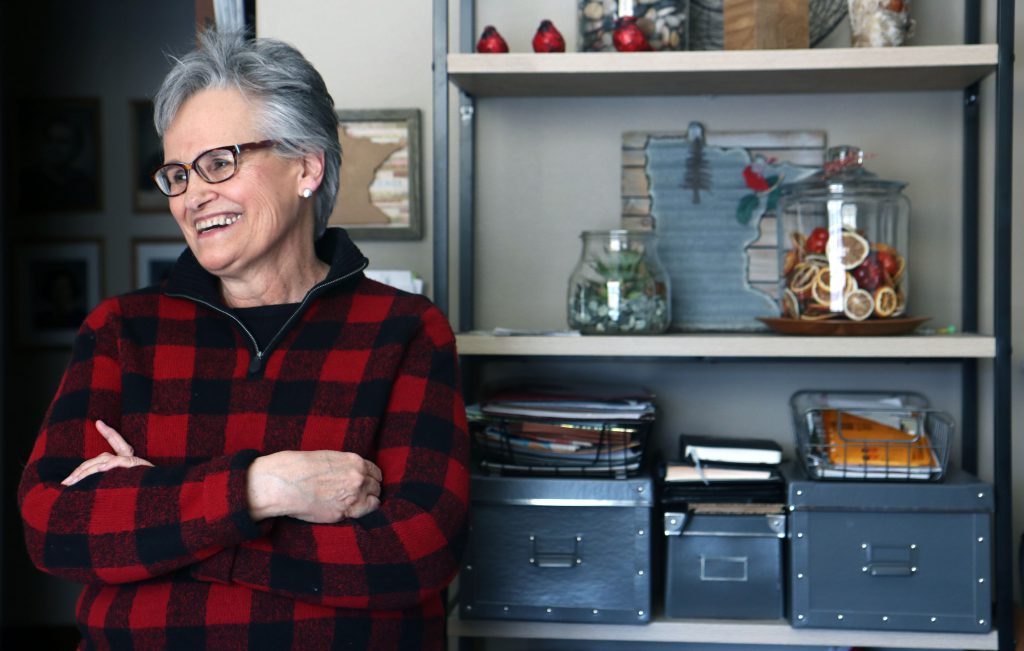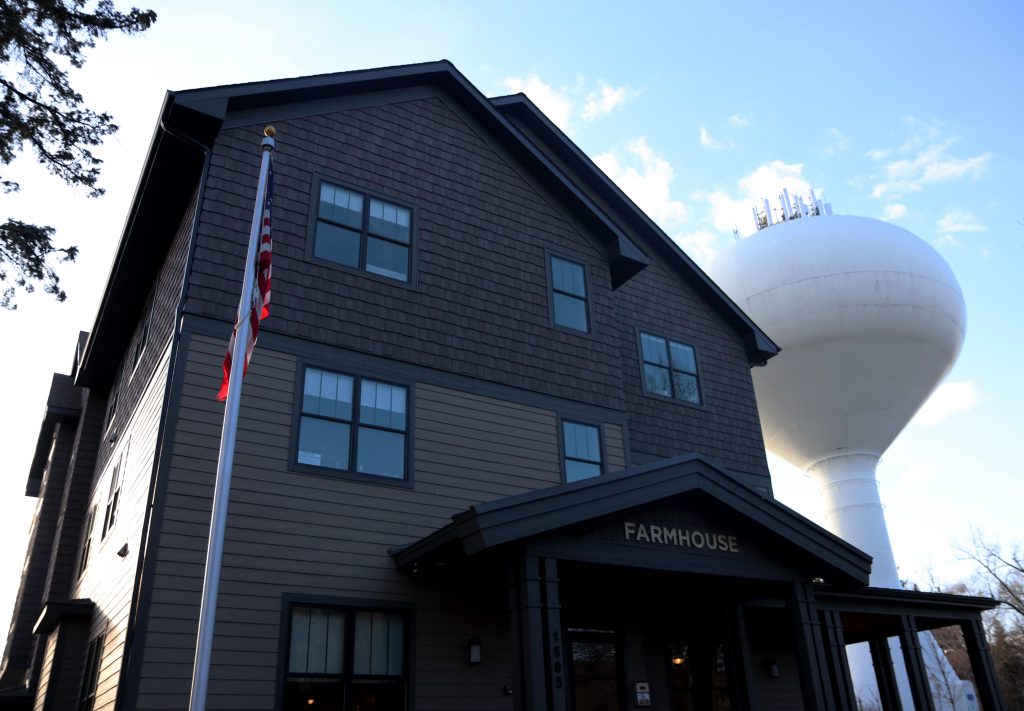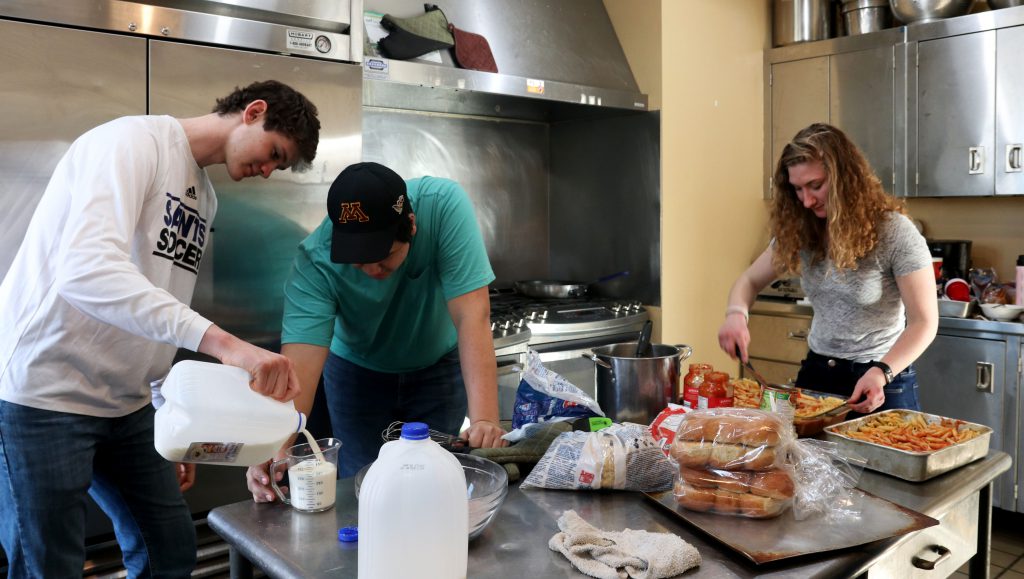Two agricultural fraternities diverge from their common roots
By Angel Rose and Bella-Dally Steele
Mary Ann Bannerman may have never been a member of FarmHouse when she studied at the University of Minnesota – Twin Cities 46 years ago, but she has a longer and more colorful history with the fraternity than most of its alumni.
Bannerman’s younger brother joined FarmHouse, one of the university’s three agricultural fraternities, when he followed her to the university. Her nephew later served as president. And when she was in school as a member of the nearby agricultural sorority, Beta of Clovia, Bannerman had her own special relationship with FarmHouse.
“I pulled an awful lot of pranks on FarmHouse. Like stealing their sign and stringing… garments… up on the flagpole,” Bannerman said between chuckles.

Photo Credit: Samantha Freeman
Now, she’s watching the fraternity evolve. For the past 14 years, as the resident House Mother, Bannerman has watched FarmHouse branch out from its country roots by garnering a mix of rural and metro members, reflecting broader trends washing over the St. Paul campus where the fraternity is located.
The fraternity’s membership has grown from 40 to 50 members in the past decade. By contrast, FarmHouse’s neighbor, smaller fraternity Delta Theta Sigma, has faced a struggle to hold onto its agricultural history while still maintaining a viable membership.
The cultural shift in FarmHouse reflects a changing demographic on the Twin Cities campus as well as the changing realities of the agriculture business, where more students are headed to ancillary jobs in agriculture.
Leaders of FarmHouse said they are responding to these realities: The pool of agriculture students is shrinking, and those who remain have less time to devote to fraternity life. Reaching out beyond the “rural profile” makes sense.
The evolution of FarmHouse has caused some grumblings from members who said it’s assimilating into Minneapolis’ “East Bank” city culture rather than sticking to its St. Paul origins. But FarmHouse member and house education director Shawn Flynn, a sophomore studying political science, said the fraternity is slowly settling into its new skin.
“[It’s] a subtle movement away from being explicitly rural to being more mixed, but the values are still the same,” he said.
FarmHouse grows
Two years ago, FarmHouse built a $4.2 million house to replace its old one, said vice president of recruitment Logan Knorr, a junior studying mathematics. No rascally Beta of Clovia members could feasibly steal the FarmHouse sign now; the original wooden sign has been replaced with a prank-foiling cement one.
The rebuilt house has more rooms, and offers additional amenities to members and potential recruits, giving it a competitive edge when compared to other fraternities on the St. Paul campus.
“Anything you want to do in this house, it’s, like, really easy to do it,” said Knorr, “the technology we have employed is, like, state of the art.”
As an organization, FarmHouse has successfully grown to have an international reach, far surpassing its humble beginnings at the University of Missouri. The founders, according to the university’s FarmHouse chapter president, Eric Olson, “were proud to be farmers in college” in 1905, when it was less common for people from farming backgrounds to pursue higher education. So when students teasingly called their frat house the “farmers house,” they embraced the name.
Traces of these rural sensibilities still remain. The members pray before every meal, attend Bannerman’s weekly “touch-base” sessions, where she sometimes teaches manners lessons, and maintain a no-alcohol policy within the house, although they still can drink outside its walls.
But with the new house has come a heavier responsibility to keep membership up, and the increased, diversifying numbers are changing the fraternity’s culture, Flynn said.

Photo Credit: Samantha Freeman
In recent years, the fraternity has seen tweaks as big as a multimillion dollar construction project, and as small as the end of their tradition of offering guests milk and cookies.
“With a new house comes new people,” Flynn said of the increasingly metro makeup of FarmHouse. “But I feel like having people of all different backgrounds is a strength, not a weakness.”
This shift towards a more diverse membership is likely also due to overall trends at the university, where the percentage of Greater Minnesota students has declined by 2 percent since 2009 while that of metro-area students has stayed the same. At the College of Food and Agricultural Sciences (CFANS), for example, approximately 28 percent of CFANS students are from Greater Minnesota, a 16 percent drop from merely 20 years ago when rural students accounted for almost half of the college’s student population, according to data from the university’s Office of Institutional Research.
As the pool of male agriculture students has waned, the competition has intensified among the St. Paul fraternities of FarmHouse, Delta Theta Sigma and Alpha Gamma Rho to recruit them.
Adding to those difficulties are increasing numbers of students graduating in fewer than four years or spending less time as active members as other activities become more demanding, Bannerman said.
It just made sense to reach beyond the strict rural background of past memberships, she said.
The evolving makeup also reflects changes in the agriculture industry, as students look beyond farming or animal sciences to agriculture business, marketing or communications.
“A lot of it has to do with the changing nature of farming,” said FarmHouse’s recruitment director Knorr. “Small farms are kind of getting crushed by big dairy… But that’s the nature of business.”
DTS struggles to keep up
Even though Bannerman characterizes the shift as subtle, St. Paul’s Greek community has certainly noticed FarmHouse is changing.
“It’s becoming FarmHouse less and less,” said Dan Hayes, president of rival fraternity Delta Theta Sigma. Because fewer farm kids were in it, he added, other fraternities have taken to calling it simply “House.”
While FarmHouse was building a brand new house, DTS members were merely planning renovations to update the house they’ve owned since the 1960s, Hayes said.
Today, DTS is less than a third the size of FarmHouse. During the past decade, the fraternity has dropped from 18 to 13 members, said Hayes, who is a senior studying agriculture communication and marketing. Last fall, DTS’s membership dipped as low as six members after nearly half the fraternity graduated.
Although DTS may have fewer members, Hayes said it’s exactly this independent “underdog” culture and intimacy that makes members proud to be part of the fraternity, which has remained more connected to the same rural roots from which FarmHouse has strayed.

Photo Credit: Samantha Freeman
Unlike Farmhouse or Alpha Gamma Rho, the other agricultural fraternity on St. Paul campus, DTS’s small size allows for members to maintain close relationships, said DTS vice president Isaac Nelson, a freshman studying animal science.
“The university is really good about being inclusive, but sometimes it feels like St. Paul gets pushed away,” Hayes said. “[At] DTS, we’re just trying to be a family, to understand each other and help each other grow to be a community.”
Animal science major and DTS member Kenny Strobel said he was drawn to the fraternity because the smaller feel of the St. Paul campus makes it feel like a “different school.”
DTS’s size has kept the fraternity loyal to its agricultural brand. Today, 11 of the 13 members are CFANS majors, and 11 come from rural backgrounds, Hayes said. Six of them have family who are DTS alumni.
The future is here
FarmHouse leadership defend the recent changes as a natural evolution of the fraternity’s makeup, and of agriculture studies in general. Even so, FarmHouse still retains its agricultural core: More than half of the members are CFANS majors, and 38 out of 50 are from rural backgrounds.
President Eric Olson said although FarmHouse members come from a wider variety of majors and backgrounds, the membership continues to uphold the fraternity’s four main pillars: intellectual, physical, spiritual, and social and moral excellence.
Members attend church together, host Bible studies at home and say a group prayer before their meals that are, they note, prepared by other members—not in-house chefs, as other fraternities often have.
“We do all of our own house jobs, cleaning, we do all of our own cooking,” Olson said, adding that these jobs help members prepare for life after graduation.
Flynn, too, agrees that the core of FarmHouse hasn’t changed despite what others may say.
“We changed from a lot of guys washing cattle before the State Fair,” Flynn said. “To a diverse group of guys with diverse interests, different backgrounds, but the same common beliefs.”


